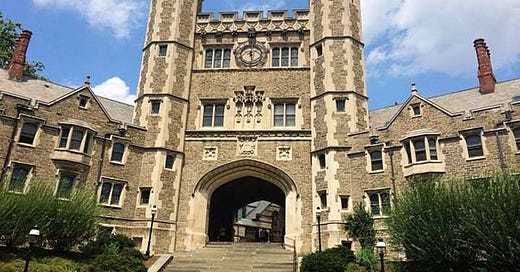Colleges and universities are in the line of fire big-time these days. The charges run the gamut: dubious degrees, unaffordable tuitions, over-emphasis on racial & lifestyle diversity, under-emphasis on political diversity, rude & obnoxious student behavior, and the list goes on.
One aspect of college coming under attack from lawmakers is tenure. A tenured professor, according to definition, cannot be fired, except under extreme circumstances. Five states, including my home state of Texas, have concluded that academic tenure is a major cause of college disfunction, and are advancing legislation to ban it.
There are really two issues here: One, is academic tenure a good or a bad thing? And secondly, is this a problem to be solved via legislation? Let us address these one at a time:
The curious thing about tenure is that, to the best of my knowledge, no other occupation has anything remotely resembling it. Tenure advocates argue that it is necessary to attract good talent. But, all industries like to hire, and keep, talented workers. Employers can offer all sorts of perks and sweeteners and bennies to make a job more enticing. But only in academia do we see this “tenure” thing. Why?
According to my research, the one phrase that pops up most often with tenure advocates is: “academic freedom.” That means right to teach or research whatever, and however, one wishes, without fear of harassment, prosecution, or job loss, due to disagreements regarding content, methodology, or politics. Now granted, I certainly would hate to be prosecuted or fired over a political disagreement, but this demands some analysis.
First off, there’s this thing called an employment contract. Agreed upon by both parties on the date of hiring, it specifies what the employee is expected to do. It could be oral or written, but every job has some form of it. And if the employee fails to abide by the contract, well, that is grounds for firing.
Thus, as long as the professor (or any employee) does what their contract says, all should be well. But if he/she fails to do so, instead performing tasks not on the contract, on company time, earning a company paycheck, then a conference with the paycheck-signer is in order. Claiming that one’s “academic freedom” is being denied won’t fly. One must do the job one is paid to do.
Granted, some employers are jerks. They cannot be pleased, no matter what. But a tenure agreement will not fix that.
Ok, so let’s say the professor is abiding by the terms of the contract, and is on good terms with the university administration. But what if there is a political disagreement between what the professor said or wrote, and what the current political ruling class decrees? What if the edict comes down: fire the professor! This (hypothetical) situation is a clear violation of “academic freedom,” and thus the institution says tenure is their only protection.
But hold on - here in the United States, we already have an enshrined law to codify Freedom of Speech and prevent this kind of abuse: the First Amendment to the Constitution. If the professor is indeed on good terms with the administration and is doing a good job, and the students are happy and the donors are happy, then the university or institution has the right - nay the obligation - to stand up to the authorities and defend the professor. The government has no authority here. Saying “We’d like to fire him, but he has tenure!” is a cop-out. The professor is doing his job. University administrators: do yours!
But let’s cut to the chase: the real reason that tenure is peculiar to the teaching profession is because the vast majority of teachers are politically on the left. At top colleges, Democratic professors outnumber Republicans 9 to 1. And the leftist philosophy is not exactly oriented to productivity, commerce, and achievement. Leftists believe, among other things, that income should be guaranteed, and nobody should ever lose their job. Government is there to take care of us, while all employers are evil, greedy exploiters. Given that, it’s no surprise that teachers clamor for a job where they can never be terminated.
The only glitch with this analysis is in regard to another profession where nearly everybody is politically to the left: the mainstream news media. Yet you don’t hear about news journalists clamoring for tenure. Why? Because unlike the education industry, news organizations are not married to the government. In the United States, K thru 12 education is all tax-supported, and at the college level, the average bachelor degree costs taxpayers over $60,000. But news media outlets are purely free market businesses. Their revenue comes from consumers and advertisers, not taxpayers. Fail to keep the customers happy, and staff gets terminated. Awarding tenure is not an option.
So now, back to our earlier question regarding whether banning tenure is a job for the legislature. Schools and colleges should be considered autonomous institutions, free to set their own conditions for hiring and firing staff - without interference from politicians and bureaucrats. But here again is that darn money thing. The government is subsidizing (or fully paying) the education bill - and that money comes with strings attached.
So if improving college education is the goal, then the ultimate path forward is clear: don’t attempt to micromanage universities and making a fuss over how professors are hired and fired. Rather, simply get government out of the picture. Colleges should raise their own revenue, without taxpayer support. Let the free market determine how best to do it. Then they’d likely conclude that this tenure thing is not a good business plan.









Government employees - certainly the Federal Government - are effectively tenured from Day One. Years ago, as a colonel in the Army, I had, at one point, around 3,000 government civilians working under me. The joke used to be once hired, we had a 25 year mouth to feed - because the only infractions that could lead to firing were timecard fraud, sleeping at their desk or getting caught surfing porn on government IT systems. That's a bit of hyperbole, but we once had a guy in jail awaiting his murder trial receiving a paycheck bi-weekly until his PTO ran out - and even then, we couldn't fire him - or replace the vacant position he occupied. Yes, it IS possible to fire an underperformer - but that is every bit as difficult as it's rumored to be. It can take years of careful documentation, which gets interrupted the moment supervisors change or the employee switches jobs. Then it starts all over again. And then it still has to go through appeals and union grievances - and all the while the employee is filing Unfair Labor Practices (ULPs), EEO and IG complaints against the entire leadership chain.
The Civil Service Protection Act, which was ironically enacted to make it EASIER to fire federal employees for misconduct, effectively makes it impossible to remove federal employees for just about any reason. The idea behind these "protections" was that civil servants should be protected from the vicissitudes of politics, and kept free to render their best professional judgment without fear of reprisal. Sound familiar?